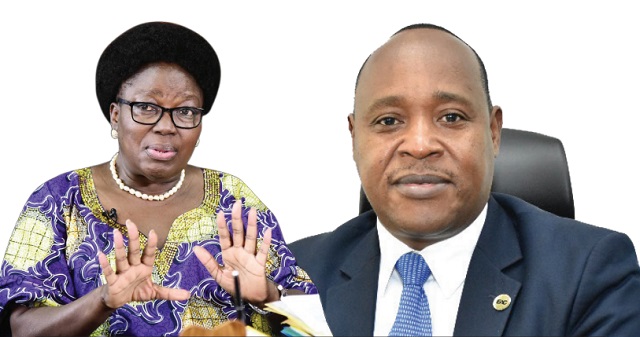Rebecca Kadaga, Uganda’s First Deputy Prime Minister and Minister for East African Affairs has protested the way the recruitment of staff has been going on at the East African Community Secretariat.
Following the 42nd Extraordinary Meeting of the East African Community (EAC) Council of Ministers held in May 2021 where several vacant positions in the secretariat were approved to be filled, four dozen jobs including; the Clerk and Deputy Clerks to the East African Legislative Assembly (EALA), Administrative Officers, Human Resource Officers, Communication Officers, Health Officers, Civil Engineers, Aviation Officers, and Research Officers among others were advertised. Close to 15,000 East Africans applied for the 50 available jobs and the secretariat has since July been sieving the applications.
The EAC Secretariat website explicitly talks about equal treatment irrespective of political inclination, gender, colour, religion, culture, education, social status, ethnic affiliation or nationality when it comes to employment at the secretariat.
“If you are a national of one of the six EAC partner states, you are eligible to apply to join the team. Recruitment of staff of the community shall as far as possible be reflective of equal representation of gender and the partner states,” the advisory reads in part.
“In relation to non-discrimination, all persons working for the EAC (organs and institutions) shall not practice any form of discrimination. In the same vein, they shall be entitled to equal treatment irrespective of political inclination, gender, colour, religion, culture, education, social status, ethnic affiliation or nationality.”
However, some Ugandan legislators recently blew the whistle over what they say is the unequal distribution of jobs among the six member states. One legislator, Denis Namara, has led the protest often questioning the recruitment process. He has even staged walk-outs during Parliamentary sessions in Arusha to force the Speaker of EALA, Martin Ngoga, to suspend sittings.
Namara and his Ugandan colleagues say the recruitment is premised on the principle that citizens from all partner states should enjoy the same rights to employment opportunities accruing from the integration process.
Equally, the staff rules and regulations require that the recruitment will be done on a quota system, which provides that partner states must have points for its citizens to be considered as eligible candidates. The rules provide that a country must have a minimum of 14 points. But the Ugandan MPs say this did not happen with the Clerk position. They say Tanzania and Kenya were ineligible to front candidates for the clerk position.
It all started with the rejection of the appointment of Albert Lumumba Obatre, a Ugandan national to the post of Clerk to the EALA House. It is alleged that Obatre scored the highest marks and met the qualifications advertised. Instead, Othman Yakubu from Tanzania took the job.
The Ugandan MPs protested. The lawmakers joined by their counterparts from Burundi and South Sudan moved a motion, seeking to block the exercise, claiming it was full of fraud but their complaints went unheard.
Other ordinary Ugandans, Peter Kigozi, an accountant, and Bernard Wasswa, a lawyer, have recently run to the East African Court of Justice to stop the process.
The two claim that their chances of getting jobs were slim as the directive of the 42nd Extra Ordinary EAC Council of Ministers that the recruitment panel should be composed of at least a representative from each of the partner states was ignored.
The discontent from the Ugandans finally sucked in Kadaga who was appointed the First Prime Minister and Minister of East African Affairs in June this year. On Oct.15, she wrote to Peter Mathuki, the Secretary General of the East African Community asking him to halt the recruitment of new staff to the Secretariat’s organs and institutions.
Kadaga said in her letter that the interviews which were scheduled to start on Oct.18 should be halted until the Secretariat submits the available quota points for each partner state. She said the Secretariat should furnish Uganda with information in regards to the points Uganda has in each of the organs and institutions so that it is known how many positions Ugandans hold in those institutions.
On Oct. 16, Mathuki rejected Kadaga’s request to postpone the interviews. Mathuki argued that Kadaga’s request had come in late and all air tickets for the panelists had been purchased and sent and it would be costly and possibly lead to litigation. He allayed Kadaga’s fears saying her concerns would be handled at the next Council of Ministers Meeting.
He also promised South Sudan 15 positions courtesy of affirmative action but the South Sudanese legislators in EALA wondered where the positions Mathuki promised would come from considering they were not advertised anywhere. Gai Deng, one of the South Sudanese representatives, said Mathuki was trying to divert the entire discussion from the real issue which is the irregularity in the recruitment exercise at the Secretariat.
![]()




























